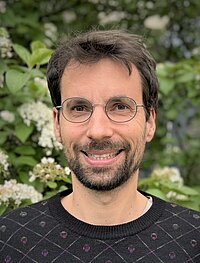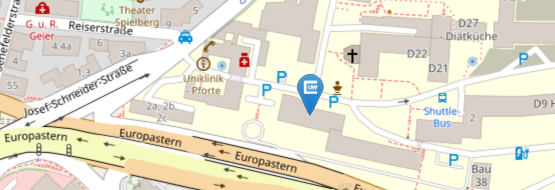Dr. med. Tobias Mühling
Arzt / Arbeitsgruppenleiter / Wissenschaftlicher Mitarbeiter am Institut für Medizinische Lehre und Ausbildungsforschung am Universitätsklinikum Würzburg
Adresse: E-Mail: Muehling_T@ukw.de |
|
Vita
- Leitung der Lehrklinik am Universitätsklinikum Würzburg (seit 2023)
- Wissenschaftlicher Mitarbeiter am Institut für Medizinische Lehre und Ausbildungsforschung Würzburg (seit 2020). Leitung der Arbeitsgruppe „Virtual Reality-Simulation im Medizinstudium“ (seit 2022)
- Medizinische Entwicklung und Koordination desVR-basierten Simulationstrainings STEP-VR (seit 2018)
- Facharzt für Innere Medizin (seit 2021) an der Medizinischen Klinik II der Uniklinik Würzburg (seit 2019)
- Assistenzarzt Klinik für Gastroenterologie und Hepatologie, München-Klinik Bogenhausen (2014 – 2018)
- Medizinstudium Universität Ulm (2007-2013). Experimentelle Doktorarbeit über Molekulare Pathomechanismen bei Amyotropher Lateralsklerose im Institut für Angewandte Physiologie
Forschungsschwerpunkte
- Entwicklung von digitalen/VR-basierten Fallszenarien
- Erforschung von VR-basierter Simulation als Lehr- und Prüfungsmethode
Reviewertätigkeit
- Journal of Medical Internet Research
- European Heart Journal - Digital Health
- German Journal of Medical Education
- Virtual Reality
Publikationen (Fachartikel)
Schaal, Jan; Leutritz, Tobias; Lindner, Marco; Backhaus, Joy; König, Sarah; Mühling, Tobias (2025). Uncovering Immersive Competence as a Hidden Bias in VR-Based Clinical Assessment – A Randomized Controlled Study. (Preprint)
Schreiner, Verena; Backhaus, Joy; Lindner, Marco; Heinisch, Melina; König, Sarah; Oberdörfer, Sebastian; Mühling, Tobias (2025). Specific Immersive Competence in VR-Based Assessments: Development, Psychometric Evaluation and Associations with Medical Performance. (Preprint)
El-Sourani, Nader; Mühling, Tobias; Klarmann, Rene; Quintes, Susanne; Bockhorn, Maximilian (2025). Implementation and Analysis of a Fully Immersive Virtual Reality-Based Emergency Training in a Surgical Curriculum. Advances in Medical Education and Practice https://doi.org/10.2147/AMEP.S507357
Oberdörfer, Sebastian; Heinisch, Melina; Mühling, Tobias; Schreiner, Verena; König, Sarah; Latoschik, Marc (2025). Ready for VR? Assessing VR competence and exploring the role of human abilities and characteristics. Frontiers in Virtual Reality. https://doi.org/10.3389/frvir.2025.1608593
Keicher, Franca; Müller, Mirja; Ruf, Katharina; Härtel, Christoph; König, Sarah; Mühling, Tobias (2025). Enhancing Pediatric Emergency Training: The Impact of Virtual Reality- Simulations on Medical Student Knowledge and Learning Experience. Virtual Reality. https://doi.org/10.1007/s10055-025-01243-9
Mühling, Tobias; Demmler, Lea; Backhaus, Joy; König, Sarah (2025). How Personality and Affective Responses are Associated with Skepticism towards Virtual Reality in Medical Training – A Pre-Post Intervention Study. Cyberpsychology, Behavior, and Social Networking. https://www.liebertpub.com/doi/10.1089/cyber.2024.0567
Lehmann, Marie; Mikulasch, Jan; Poimann, Horst; Backhaus, Joy; König, Sarah; Mühling, Tobias (2025). Training and Assessing Teamwork in Interprofessional Virtual Reality-based Simulation using the TeamSTEPPS framework – Protocol for a Randomized Pre-post Intervention Study. JMIR Research Protocols. https://www.researchprotocols.org/2025/1/e68705
Lindner, Marco; Leutritz, Tobias; Backhaus, Joy; König, Sarah; Mühling, Tobias (2025). Knowledge Gain and the Impact of Stress in a fully immersive Virtual Reality-based Medical Emergencies Training with Automated Feedback – A Randomized Controlled Trial. Journal of Medical Internet Research. https://www.jmir.org/2025/1/e67412
Mühling, Tobias; Schreiner, Verena; Appel, Marc; Leutritz, Tobias; König, Sarah (2025): Clinical Competency Assessments: Comparing Virtual-Reality-Based and Traditional Physical OSCE Stations – A Randomized Controlled Trial. In: Journal of Medical Internet Research. https://www.jmir.org/2025/1/e55066
Keicher, Franca; Backhaus, Joy; König, Sarah; Mühling, Tobias (2024): Virtual reality for assessing emergency medical competencies in junior doctors - a pilot study. In: International journal of emergency medicine 17 (1), S. 125. https://intjem.biomedcentral.com/articles/10.1186/s12245-024-00721-2
Mühling, Tobias; Späth, Isabelle; Backhaus, Joy; Milke, Nathalie; Oberdörfer, Sebastian; Meining, Alexander et al. (2023): Virtual reality in medical emergencies training: benefits, perceived stress, and learning success. In: Multimedia Systems 29 (4), S. 2239–2252. https://link.springer.com/article/10.1007/s00530-023-01102-0
Mühling, Tobias; Rohrbach, Helmut; Schepp, Wolfgang; Gundling, Felix (2021): Overlap of concurrent extrahepatic autoimmune diseases is associated with milder disease severity of newly diagnosed autoimmune hepatitis. In: Hepatobiliary & pancreatic diseases international: HBPD INT 20 (1), S. 21–27. DOI: 10.1016/j.hbpd.2020.06.019.
Gundling, Felix; Parasiris, Paris; Bunz, Anna-Lena; Sohn, Maximilian; Haller, Bernhard; Schepp, Wolfgang; Mühling, Tobias (2019): Deficits in Health-Literacy of Inpatients - a Cross-Sectional Study. In: Deutsche Medizinische Wochenschrift (1946) 144 (4), e21-e29. DOI: 10.1055/a-0758-0647.
Kübel, Dorothee; Tiller, Maximilian; Mühling, Tobias; Sohn, Maximilian; Vallbracht, Inka; Waschulzik, Birgit et al. (2018): Liver disease in systemic Lupus erythematodes - results of an explorative observational study. In: Zeitschrift fur Gastroenterologie 56 (10), S. 1257–1266. DOI: 10.1055/a-0645-7200.
Heiser, Clemens; Haller, Bernhard; Sohn, Maximilian; Hofauer, Benedikt; Knopf, Andreas; Mühling, Tobias et al. (2018): Olfactory Function is Affected in Patients with Cirrhosis Depending on the Severity of Hepatic Encephalopathy. In: Annals of hepatology 17 (5), S. 822–829. DOI: 10.5604/01.3001.0012.3143.
Mühling, Tobias; Gundling, Felix; Helmberger, Thomas; Schepp, Wolfgang (2017): Traveler's Diarrhea, vision abnormalities and unsteady gait in a young woman. In: Zeitschrift fur Gastroenterologie 55 (4), S. 379–382. DOI: 10.1055/s-0043-100119.
Mühling, Tobias*; Duda, Johanna*; Weishaupt, Jochen H.; Ludolph, Albert C.; Liss, Birgit (2014): Elevated mRNA-levels of distinct mitochondrial and plasma membrane Ca(2+) transporters in individual hypoglossal motor neurons of endstage SOD1 transgenic mice. In: Frontiers in cellular neuroscience 8, S. 353. DOI: 10.3389/fncel.2014.00353.
Fuchs, Andrea; Kutterer, Sylvie; Mühling, Tobias; Duda, Johanna; Schütz, Burkhard; Liss, Birgit et al. (2013): Selective mitochondrial Ca2+ uptake deficit in disease endstage vulnerable motoneurons of the SOD1G93A mouse model of amyotrophic lateral sclerosis. In: The Journal of physiology 591 (10), S. 2723–2745. DOI: 10.1113/jphysiol.2012.247981.



